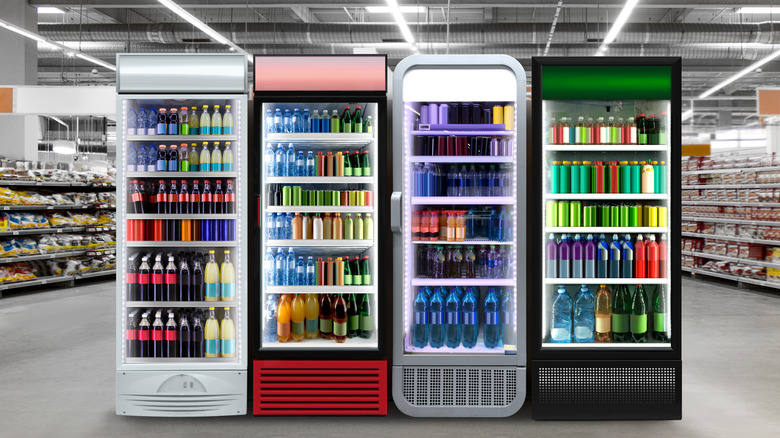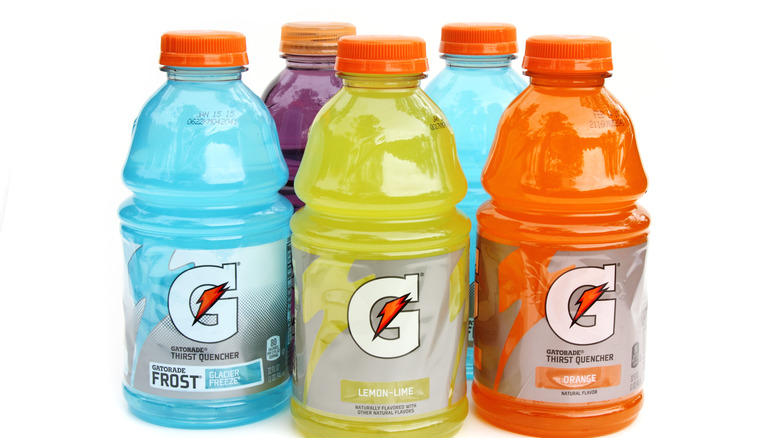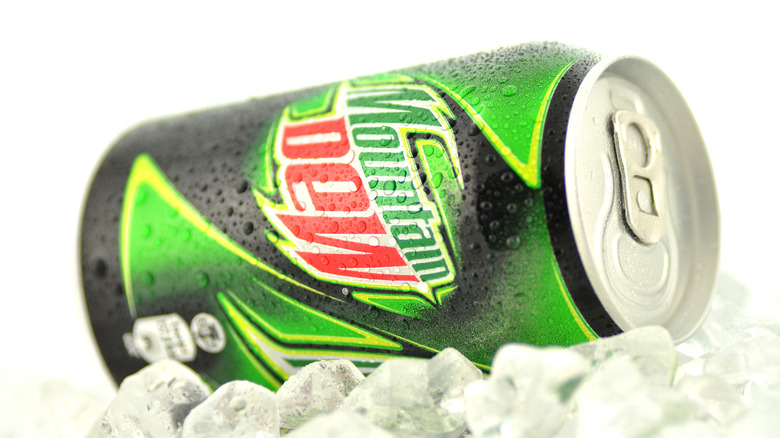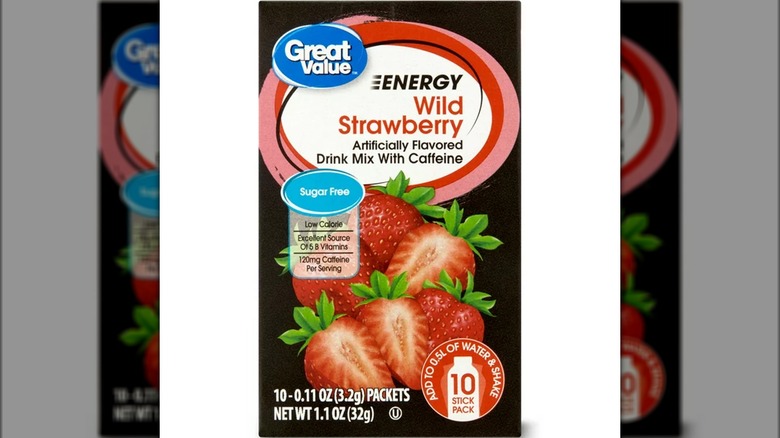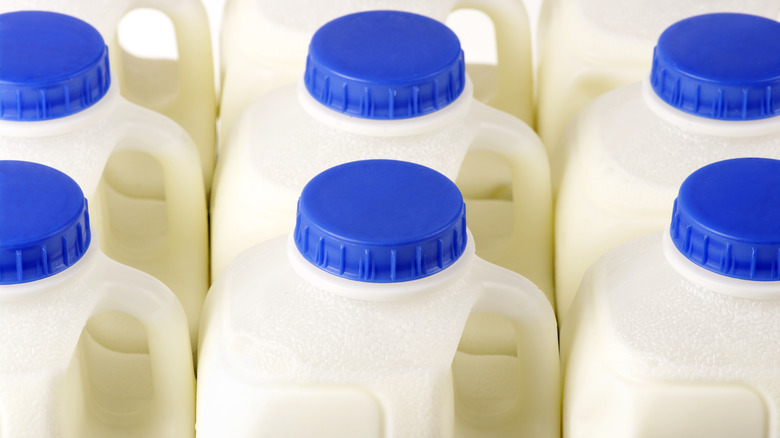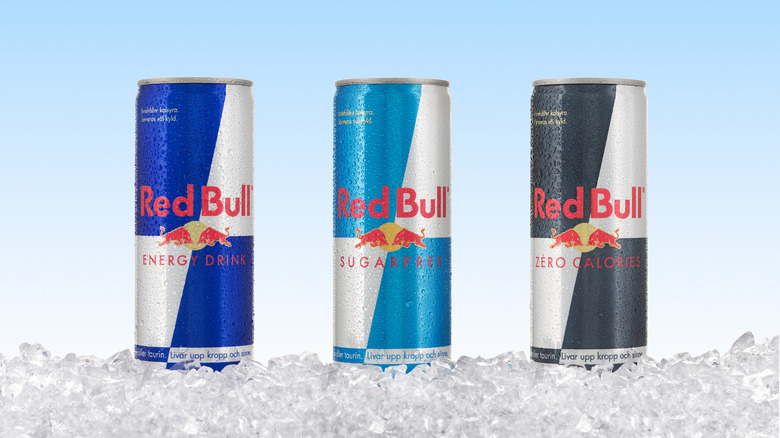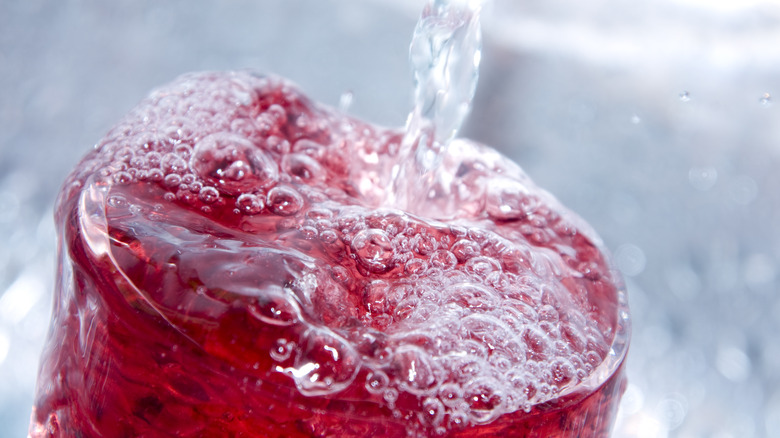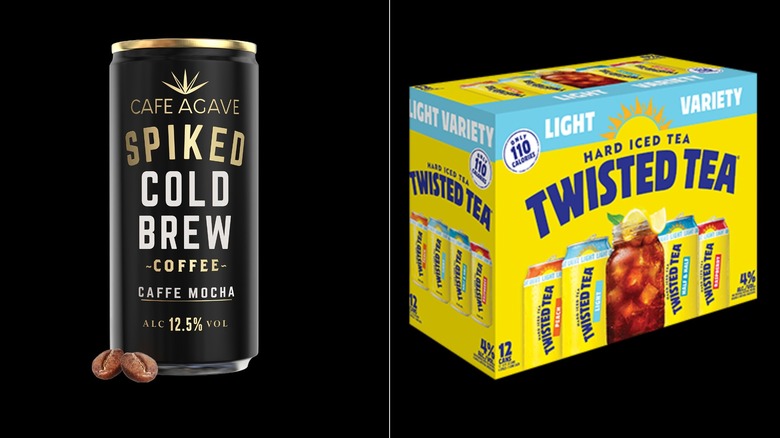7 Drinks And The Reasons They Were Banned In Other Countries
We may receive a commission on purchases made from links.
If you're traveling outside of the United States, don't be surprised if you can't find some of your favorite beverages for sale. In fact, these seven popular products that are common in supermarkets and households across the country are downright banned in other parts of the world. Most of these drinks are not available because they have one or more ingredients listed in them that have been deemed unsafe or harmful to consume in other countries.
The Food and Drug Administration in the U.S. is the authority on food and medicine safety. This organization determines whether or not food and medicine are safe, the possible side effects, and any possible dangers and concerns, such as recalls and news updates that ensure public health. However, the FDA's standards do not always align with other entities. Each separate organization in each country has a unique set of restrictions, limitations, and requirements. For example, in Canada, the Canada Food Inspection Agency is responsible for monitoring food safety, while the European Food Safety Authority sets the standards in European countries. The latter of which has found that certain ingredients, such as titanium dioxide and brominated vegetable oil, pose some danger and restrict usage.
Foods and medicines are constantly analyzed and studied, and a particular ingredient can earn FDA approval at one point, only to lose it later. These particular products, such as Gatorade, Mountain Dew, and even U.S. milk, have raised concerns in other countries, and here are the specific reasons why.
1. Gatorade & Other Citrus Drinks
Gatorade is arguably the ultimate sports drink in the U.S., but it's not always easy to find in other countries because it contains brominated vegetable oil, which has been linked to negative health effects, as reported by The New York Times. This well-known brand has been around since 1965, when it was invented at the University of Florida as a way for athletes to combat serious heat and still perform well.
The thirst-quenching beverage hasn't lost its appeal since then, at least in the U.S. Athletes appreciate the tasty flavors and the dose of salts and sugars that are absorbed more easily. However, the citrus-flavored options raised concerns in the 1970s when scientists began looking into BVO. This ingredient is used to keep citrus flavors from separating, and it creates a more appealing cloudy appearance.
The concerns were that BVO, which is prevalent in a great number of drinks, could eventually cause neurological problems and a whole slew of other side effects. The European Union and Japan have banned the ingredient. Certain companies and brands have made efforts to remove this ingredient, and PepsiCo replaced BOV in Gatorade with sucrose acetate isobutyrate; however, similar-tasting products still contain the substance.
Great Value Orangette Orange Soda Pop, Sun Drop Citrus Soda Pop, for example, still lists BVO on the ingredients list. Although the dangers of this ingredient have been a concern for some time, it's always best to double-check your ingredients label, especially when buying off-brand items or products you're unfamiliar with.
2. Mountain Dew
This sweet and satisfying drink might appear harmless on a hot summer day while enjoying a hearty hamburger or hot dog, but in addition to a whopping 46 grams of sugar and the artificial color Yellow 5, Mountain Dew can cause serious side effects. It's the emulsifier that can cause issues such as headaches, memory loss, and loss of coordination, claims Middlesex Health. Although some companies have made efforts to limit or remove BOV from certain drinks, Mountain Dew still contains the ingredient, which is why it's been banned in other countries, such as Japan, the Netherlands, and the European Union.
This specific ingredient has raised concerns and landed it on the banned list. In addition to the popular brand Mountain Dew, this harmful ingredient is also present in several off-brand sodas that can easily be found on the shelves in the U.S. but not in other countries. A few examples are Great Value Mountain Lightning Citrus Soda and Food Lion Soda, Citrus Flavored. The reason that BVO has not been banned in the U.S. is because the FDA has approved vegetable oil that's been modified with bromine as being safe in small amounts. However, more and more consumers and scientists are questioning the safety of the ingredient, and it has even been banned in California, and other states could soon follow, according to EWG.
3. Great Value Wild Strawberry Drink Mix
Another ingredient that is banned in the European Union but not in the U.S. is an additive called titanium dioxide, as stated by European Food Safety Authority. This item can be found on the nutrition label of popular items such as fruit drink mixes that come in a powdered form and are added to water, such as Great Value Wild Strawberry Drink Mix and Árbol Frutal Tangy Limeade.
Titanium is a metal element that can be found in nature and has a unique reaction when it comes into contact with oxygen. After processing, the titanium dioxide becomes excellent at scattering light, which makes it useful in products such as sunscreen. However, it has also been used for coloring food, specifically beverages. Once it's been ultra-processed and treated, it can be considered food-grade.
Even though this ingredient is found in our food and is used as a whitening agent, it is considered insoluble, which means it will not dissolve in water. Titanium dioxide is considered safe by the FDA, but they recommend consuming it in extremely small doses, or it could cause cancer or issues such as irritation, trouble breathing, and bronchitis in the lungs as warned by the New Jersey Department of Health. In 2022, the European Commission implemented a plan to ban the use of titanium dioxide as an additive in food. The Jordan Food & Drug Administration and Health Canada followed suit.
4. U.S. Milk
Many dairy farmers in the U.S. use a synthetic hormone called rBGH, which is meant to boost milk production in cows. However, the hormone has led to more infections in cows and has been linked to concerns about cancers, according to the American Cancer Society. The result is that the hormone and, subsequently, milk supply that's been produced with it was banned in Canada in 1999, as reported by the Dairy Farmers of Canada.
Studies have shown that the use of rBGH in cows results in a significant increase in infections that must be treated with antibiotics. Not only are consumers then exposed to the antibiotics, but it has raised concerns about super bacteria that are resistant to antibiotics.
But the health concerns don't stop there. Drinking milk from cows treated with rBGH has been linked to high levels of a growth factor called IGF-1 in humans, which can have negative effects, as revealed in an excerpt from "Cancer Medicine" on Wiley Online Library. Some studies have even suggested a link between high levels of IGF-1 and certain cancers, such as lung and breast cancer. At the very least, the hormone could increase the risk of these types of cancers and more. Given these risks, it's clear why other countries are choosing to ban U.S. milk imports.
5. Red Bull and Other Energy Drinks
Red Bull and other energy drinks with excessive amounts of caffeine and an ingredient called taurine have undergone several investigations to determine the safety of the beverages. In Poland, France, and Amsterdam, Red Bull and other drinks, such as Monster Energy, have been banned, or the sale has been limited to those over the age of 18, as reported on Lexology.
The concern comes from the extreme amounts of caffeine and the marketing toward younger consumers. Recently, Notes From Poland determined that common energy drinks that are sold at discount stores for low prices contain as much caffeine as 6-8 cups of coffee. These extreme levels have been linked to issues such as heart complications, anxiety, insomnia, and dehydration, according to the CDC. Another common ingredient found in energy drinks, taurine, which is a naturally occurring amino acid and is considered safe to consume in small amounts, has raised concerns about interfering with growth in children and how our metabolisms function.
In France, the government implemented a 12-year ban on Red Bull with the formula that contained taurine; however, it has since lifted the restriction, according to Medical News Today. However, the decision to dissolve the ban was ultimately encouraged by the European Union, and the French government continued to urge caution, as stated in Austrailian Food News. In Amsterdam, PRNewswire published a case filed against several brands, including Monster Energy and Bang, for falsely advertising ingredients, such as Super Creatine. The accusation also covered brands that advertised energy drinks as nourishing or fuel for the brain and body without any supporting evidence.
6. Drinks with Red 40
Red 40, a food coloring agent that also goes by Red No. 40, Red #40, Allura red, and more, is one of the most commonly used dyes in food. It's frequently added to beverages, such as juices and sodas, and is responsible for the vibrant red color that appears in many foods. However, reports by The Council of Canadians show that multiple countries, including Denmark, Belgium, France, Germany, Switzerland, Sweden, Austria, and Norway, have restricted the use of this ingredient in beverages and more.
While some countries have banned the use of the dye completely, other countries require a special label alerting consumers that it could cause health problems, says Food Safety News. This coloring agent has been the cause for controversy since the 70s when concerns were raised that the dye, which is made from petroleum, could cause cancer and affect children's behavior, according to Healthline. Although the FDA reports that this ingredient is safe to consume in small amounts, more and more scientists are cracking down.
In fact, the ingredient was banned from the use of cosmetics years ago in the U.S. and more. More recently, Red 40 was banned in the state of California because of the risk that it could cause cancer, as stated in The New York Times. England and other countries have been working to find more natural substitutes for food dyes. For example, in England, Fanta soda is colored with natural extracts, such as pumpkin and carrot. Other substitutes for Red 40 include real strawberries, beetroot extract, and paprika extract.
7. Spiked Coffee and Alcoholic Energy Drinks
Although popular here in the States, selling products that mix caffeine and alcohol in Canada is illegal, according to the Government of Canada. This is because when caffeine is added to an alcoholic drink, it may mask the symptoms of intoxication and cause individuals to drink more than they normally would. This can cause serious detriments, such as alcohol poisoning, dehydration, and even death.
In the U.S., where espresso martinis, which are vodka and coffee, and Jägerbombs, or Jägermeister and Red Bull, are all the rage, caffeine and alcohol are a popular combo that frequently appears on bar menus. Premade products such as Twisted Tea, Cafe Agave Spiked Cold Brew, and more are becoming popular choices to give consumers a buzz and also a caffeine jolt. However, Health Canada not only restricts the sale of products that contain alcohol and a certain amount of caffeine, but it also warns the public about mixing their own drinks with this dangerous combination. The only exception to this regulation is very small amounts of caffeine that occur naturally in certain flavors, such as chocolate. However, these exceptions must be clearly marked on products in order to warn consumers and reduce risks, according to McGill.
